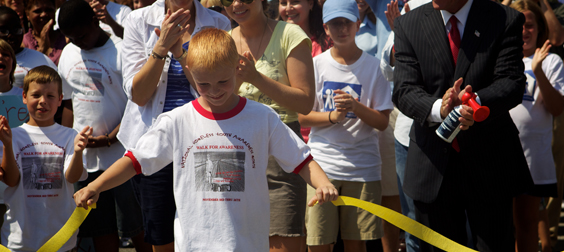Little Red Wagon
Directed by David Anspaugh
Written by Patrick Sheane Duncan
USA, 2012
In many ways, the true story of Zach Bonner, the protagonist of the new family drama Little Red Wagon, is a crying shame. No doubt, his determination to help out as many homeless families in Florida as possible is admirable and inspiring. But Zach is, when the film begins in 2004, just 8 years old. That he first is able to get his local neighborhood to pitch in for hurricane victims, and then walk from Tampa to Tallahassee to get the word out to the state government about homeless youth, is truly impressive. Why, though, does it take a kid to make us realize and confront the disturbing plight of homelessness in America? If for no other reason, Little Red Wagon is worth seeing; its good intentions sometimes can’t obscure the flawed narrative structure, but it’s still a pleasant, passable experience.
Chandler Canterbury plays Zach, who decides to get off his duff and help out his Tampa-area community after the devastating Hurricane Charley ravages parts of Florida. First, he and his older sister (Daveigh Chase) traverse through their neighborhood and hand out flyers in hopes that their fellow man can donate something to those families whose homes were destroyed in the hurricane. When Zach returns to the homes with his red wagon to collect, he finds that almost everyone pitched in. Encouraged by such decency and surprised by how many families in the state and country are without a home, Zach starts up a non-profit charitable organization (yes, really) so his selfless act doesn’t have to be contained to the hurricane effort. It culminates with Zach, his sister, and his mother (Breaking Bad’s Anna Gunn) walking the nearly 300-mile journey from Tampa to the state capital of Tallahassee to bring more awareness to the social issue at hand.
This part of Little Red Wagon isn’t exceptional in its matter-of-fact idealism, but it’s well-made and unfussy. However, Zach’s story isn’t the whole movie; a good chunk of the film is devoted to the plight of a mother and son (Frances O’Connor and Dylan Matzke) who donate to Zach at the outset, but soon find themselves without a place to stay when she loses her job and is unable to find steady employment. As we watch this duo, Margaret and Jim, move from their house to a homeless shelter, then get to such a low point where they’re digging through dumpsters, it’s tough to see what screenwriter Patrick Sheane Duncan and director David Anspaugh are trying to attempt. Are we meant to simply watch the kind of difficulties a typical homeless family faces on a day-to-day basis? You might assume Margaret’s storyline will intertwine directly with Zach’s, but it feels like it comes from a completely different movie. (And unfortunately, anyone who’s seen The Pursuit of Happyness will see an awful lot of similarities with the core relationship and conflict.)
Duncan’s script has a slew of issues—the subplot anchored by O’Connor wants badly to play on our emotions, but dulls any twists or surprises—but has enough of a laid-back, uncynical charm that the overall movie isn’t too frustrating. Canterbury and Matzke are both decent child actors, though there are a few times when they slide into being too precocious and forced. Gunn, who’s proven herself to be Breaking Bad’s secret weapon over the last few years, is far less intense here; however, she embodies the movie’s natural, relaxed and openly emotional tone. Though her arc with Chase, playing the eternally frustrated and faux-rebellious teenager, hits too many familiar beats, she, Chase, and Canterbury get a few scenes where they actually feel like a family. O’Connor, whose moment at stardom seems to have passed (remember A.I.?), is fine as Margaret, but the periods of anguish her character has at the choices she’s making move too quickly to have any serious psychological impact.
It’s safe to say that Hollywood doesn’t make movies like Little Red Wagon anymore; this is a film that forcefully turns its back on a mocking tone. The film is thoroughly and nakedly earnest, appropriate considering the lead character’s unwillingness to give up in the face of adversity. What Zach Bonner did in real life should serve as a reminder to all of us that we’re not only capable of doing great things, but that making a difference shouldn’t be so hard and infrequent. Little Red Wagon is, perhaps, not a stellar film, but stands as a decent attempt to make a kind, well-meaning family film, one that can be a lesson to the young and old.
— Josh Spiegel




